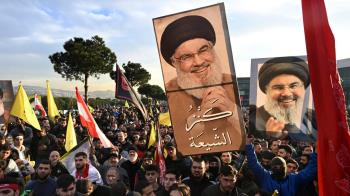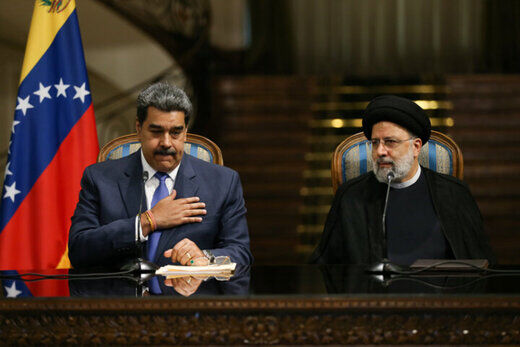Alwaght- The Iranian President Seyyed Ibrahim Raisi finished his five-day tour of Latin America, returning home with several cooperation and trade agreements and describing the visits as fruitful.
Suggesting that Iran's relations with the Latin American countries have generally developed since the Islamic Revolution of 1979, Raisi added that they have faced problems for some reasons over the past decade.
“It was necessary to have a review of relations with Latin American countries as an important and strategic center in the world and to remove the obstacles to the activation and expansion of relations,” the president added.
Stressing that Iran has a balanced view of the East and West in its foreign policy and diplomacy, Raisi noted that in the years after the Islamic Revolution, the Islamic Republic of Iran had good relations with all the countries of Latin America, but this relation was not active in the last decade due to some reasons and had caused difficulties to cooperation.... Any country in the world wants to have a constructive relationship with Iran based on respect for mutual interests we will definitely have a good relationship with it, and if someone wants to be hostile to us, our policy is to stand up and resist."
The Iranian president's Latin America tour, experts agree, is indicative of the fact that the Islamic Republic is ready to interact with the whole world and the efforts by the enemies to isolate it will go nowhere.
Several-billion agreements
In addition to political relations, the tour focused on economy and many agreements were inked in this regard. With Venezuela, 19 cooperation agreements in IT and communications, energy, insurance, maritime transportation, higher education, agriculture, medicine and pharmacy, cultural interaction, and mining were signed.
The agreement of the officials of the two countries to increase the volume of bilateral trade to $20 billion in the near future shows that the two sides are preparing for strategic cooperation in the economic field.
In Cuba, the officials of two countries signed 6 MoUs in the areas of judiciary, comprehensive political cooperation, customs relations, and IT. Cuba is one of the leading countries in the field of medicine and can neutralize many of the restrictions resulting from Western sanctions against the two countries.
During his trip to Cuba, the president visited the vaccine production line at the CIGB factory and was told about the latest measures and joint cooperation of this factory with Iranian companies. During the visit, the managers of the factory displayed the Hepatitis B, lung cancer, and Covid-19 vaccine production units named Abdala and announced the joint cooperation for vaccine production with the Pasteur Institute of Iran.
Also, Iran signed 3 agreements and MoUs in justice, trade, economy, and medical equipment. In order to facilitate trade between Iran and Latin American countries, agreements were signed to remove cumbersome customs barriers and regulations as much as possible so that businesspeople can easily do business. Also, the use of national currencies instead of dollar was one of the other issues that was agreed upon to facilitate trade with Latin America.
President Raisi’s tour marks a jump in Tehran relations with Latin America
The development of relations with Latin American countries and the strengthening of the economic foothold in this region were among the most important goals of the president's trip to the three countries of Venezuela, Nicaragua and Cuba.
Commenting on the activities during the trip, the president said that “our priority in relations with these countries was based, first, on export of technical and engineering services, second, export of technology-based products, third, providing raw material with appropriate prices, and four, creating new markets. We also had very good MoUs in upstream and downstream areas, and if they are implemented, they will mark an effective step in expansion of relations.”
Since years ago, Iran designed development plans in a bid to end its dependence on oil revenues. To this end, the administration of President Raisi is resolved to use all the capacities of the Latin American markets to diversify its non-oil exports.
Latin America, with a population of more than 650 million, with a gross domestic product of $5.5 trillion, is a good opportunity for Iran to enter this lucrative market. According to statistics, unique underground resources, including lithium, silver, copper, and iron, make Latin America one of the richest regions in the world.
The president referred to reviving the car and tractor manufacturing factories in Venezuela, adding that these factories as Iranian national assets have been closed or half-closed in over the past 9 years, and they were reopened as part of the government's policy.
Suggesting that there are high potentials in Latin America in mineral reserves, Raisi said that contracts were signed during the tour in this area, and “concerning the knowledge enterprises, 5 contracts were signed between private sectors of Iran and Venezuela worth over $90 million.”
Providing technical and engineering services and strengthening cooperation in the field of energy with Latin American countries was another part of the results of the President's visit to this region.
Experts believe that by reviving Cuba's Cienfuegos, Nicaragua’s Supreme Dream of Bolivar, and Venezuela’s Cardon oil refineries, Iran can create capacity for 200,000 to 300,000 oil barrel exports every day.
Also partnership in agriculture as one of the sectors of high capacities in Latin America amid growing water shortage crisis in Iran is another achievement of the president's tour.
"These countries are rich in terms of rainfall and arable land, and they produce some of the agricultural products we need, such as corn, soybeans, and sugar, and we can use set-off to provide these products,” said Oil Minister Ali Owji.
The set-off-based trade can avoid using the US dollar and dedollarization, in turn, can lead to neutralization of the American sanctions.
Beside focusing on economy and trade, Raisi’s tour also boosted political alliances with Latin American countries. This was pointed at by Iranian Foreign Minister Hussein Amir-Abdollahian. Commenting on Tehran-Havana cooperation, FM Amir-Abdollahian said: “Iran and Cuba are among the pioneers in the development of regional convergence, which can provide the opportunity for each other's presence in coalitions formed on two sides of globe.”
The FM mentioned the “balanced partnership” with Venezuela under the shadow of the 20-year comprehensive pact, adding that Venezuela is the trade gate of Iran to Latin America and Caribbean region.
“I'm talking about a market with 600 million population that reciprocally links Latin America and the friendly countries to the West Asian markets through Islamic Republic.”
Given the fruitful tour of the Iranian president's tour of Latin America, it seems that massive rails have been laid for expansion of trade with this region, something promising clear prospects for growing Iran-Latin America ties and partnership.



























